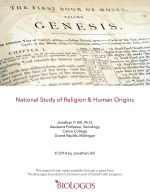
A new survey suggests that public attitudes toward religion and human origins are more diverse and less confident than the Gallup findings indicate. "It's important to know that a large portion of the population is unsure about their beliefs, and there is a large portion of the population that doesn't care," Jonathan P. Hill told the Atlantic (November 23, 2014), prior to the December 2, 2014, release of the National Study of Religion & Human Origins.
"To help generate a better picture of the landscape of beliefs, the NSRHO includes separate questions about human evolution, God’s involvement, the manner in which God created, the existence of a historical Adam and Eve, belief in literal 24-hour days of creation, and the geological timeframe for the emergence or creation of humans," the report explains (PDF). Accordingly, there are varying ways in which to parse the results.
If creationism is defined as involving denying human evolution and affirming that God created humans, the study found that 37% of the public are creationists and 29% are convinced (absolutely or very certain) creationists. If creationism is defined as further requiring that God miraculously created a historical pair of progenitors of the entire human race, then 25% of the public are creationists and 22% are convinced creationists.
Only 8% of the public are young-earth creationists, who accept that the days of creation were literally twenty-four hour days and that humans came into existence within the last 10,000 years. But the report adds, "The remaining two-thirds of creationists do not take the Old Earth view[,] however." Rather, many "are simply unsure whether the days of creation were literal, and they are especially unsure about when humans first came into existence."
As for theistic evolutionism, the report described it as less popular than creationism: "Using the broadest categorization, respondents who (a) believe in human evolution and (b) believe that God (or an intelligent force) was somehow involved in the creation of humans, 16 percent of the population can be placed in this category. Furthermore, only half of this group (8 percent) is very or absolutely certain of both of these beliefs."
Just 9% of the public are atheistic evolutionists (in the sense that they deny that God was involved in human evolution, not necessarily in the sense that they deny the existence of God). The remaining 39% of the population is unsure (or holds "uncommon views (such as believing that humans did not evolve from earlier species while simultaneously believing that God had nothing to do with the emergence of humans").
The survey also asked respondents to indicate whether having the right beliefs about human origins was personally important to them: 42% indicated that it was very or extremely important, with 63% of creationists, 52% of atheistic evolutionists, 35% of theistic evolutionists, and 23% of unsure respondents thinking so. These respondents were also asked to explain why, and the report describes their responses at length.
The Atlantic observed, "Even if people don't personally care about being right, they do seem to care a lot about what's taught in science classrooms, particularly in public schools," and NCSE's Josh Rosenau suggested that creationists are particularly concerned about evolution's account of human origins. "Who are we as people? That's the question that they think evolution is answering. What does it mean to be a person?"
The survey also investigated demography. The Atlantic summarizes, "Hill found that religious belief was the strongest determinant of people's views on evolution — much more so than education, socioeconomic status, age, political views, or region of the country. More importantly, being part of a community where people had stated opinions on evolution or creation, like a church, had a big impact on people's views."
In a post for BioLogos's blog (December 2, 2014) describing the study and explaining the factors it found to be relevant to belief about human origins, Hill wrote, "The most important takeaway here is that individual theological beliefs, practices, and identities are important, but they only become a reliable pathway to creationism or atheistic evolutionism when paired with certain contexts or certain other social identities."
